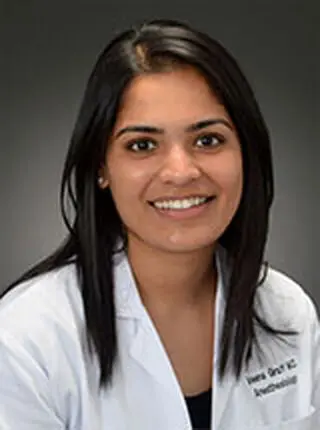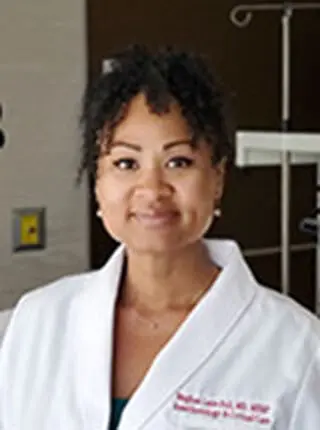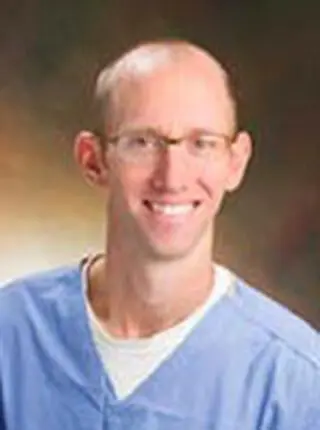Senior Scholars
CPORT Senior Scholars are doctorally-trained investigators with established or developing independent research programs. They may be mentored by senior faculty, but also serve as mentors to trainees, including CPORT Scholars.
Joshua H Atkins, MD, PhD, CPE

Joshua H Atkins, MD, PhD, CPE is Associate Professor of Anesthesiology & Critical Care and Associate Professor of Otorhinolaryngology: Head and Neck Surgery. He is Past-President of the Pennsylvania Society of Anesthesiologists and President-Elect of the Society of Head and Neck Anesthesia. He is Co-Chair of the Penn Medicine System Airway Safety Committee, and is on the editorial board of Patient Safety, a journal focused on safety in healthcare.
His work with the airway team focuses on patient-related safety programs such as extubation risk stratification and planning, tracheostomy care and emergency resuscitation, and non-procedural emergency airway preparedness. Dr. Atkins has an active research program sponsored by the Becton-Dickinson Corporation, assessing novel technologies to improve safety and accuracy of IV push medication administration in perioperative areas. Dr. Atkins collaborates with Dr. Caoimhe Duffy in the Department of Anesthesiology to on human factors related work in training, staff professional development, simulation, and safety improvement. He serves as Medical Director for In-Situ Simulation for the Hospital of the University of Pennsylvania. This program focuses on use of simulation for training, process improvement, and team building. Active projects include development of virtual reality based training tools for human factors in healthcare and optimizing online approaches to simulation for teams, employing Relational Coordination as a framework for enhanced safety, efficiency and teamwork and human-factors focused safety net analysis using a natural language processing approach.
Dr. Atkins earned a Bachelors Degree in Chemistry from Princeton University,
MD and PhD degrees from Columbia University, and the CPE credential from the Association for Physician Leadership. He completed residency training in Anesthesiology at the University of Pennsylvania and joined the Faculty in 2007.
Gary Alan Bass, MD MBA PhD FEBS (Em Surg)
Gary Alan Bass, MD MBA PhD FEBS(Em Surg) is an Assistant Professor of Surgery in the Division of Traumatology, Surgical Critical Care and Emergency Surgery in the Perelman School of Medicine at the University of Pennsylvania.
Dr. Bass is a clinical outcomes researcher and methodologist who is interested in the evidence-to-practice gap as it applies to real-world adherence to evidence-based practice guidelines in the perioperative care of surgical patients.
He was the Lead Investigator in the recent SnapAppy snapshot audit which sought to employ a a pragmatic approach to prospective observational inquiry in surgical disease that complements retrospective registry analysis and prospective randomized control trials (RCTs). He strives to discover how the approach to a patient at the individual- and systems-levels is informed by guidelines, what components of a guideline are associated with improvement in traditional and patient-related outcome measures, and how we may identify and tackle reasons for divergence from a guideline at these levels.
Molly Candon, PhD
Molly Candon, PhD is a health economist and assistant professor in the Center for Mental Health and the Department of Health Care Management at the University of Pennsylvania. Dr. Candon is interested in how insurance design and reimbursement can be leveraged to improve chronic pain management and behavioral health care. She currently has a K award from the National Center for Complementary and Integrative Health that focuses on coverage and cost sharing for acupuncture therapy. She also teaches a Wharton MBA class entitled the Business of Behavioral Health.
Justin Clapp, PhD, MPH

Justin Clapp, PhD, MPH is an Assistant Professor of Anesthesiology & Critical Care at the Perelman School of Medicine. Dr. Clapp is a medical/linguistic anthropologist whose research uses qualitative methods and social scientific theory to examine aspects of both provider-patient and provider-provider communication in perioperative settings. His projects focus heavily on generating explanatory models of decision making, including in elective surgery, regional versus general anesthesia, and chronic pain management. He is also pursuing research on the psychosocial factors that contribute to pain expectations and on the interaction between physician consultants and care teams. In addition, Dr. Clapp is a frequent collaborator with other investigators at the Perelman School of Medicine who do qualitative work outside the perioperative space.
Caoimhe Duffy, MD, MSc
Caoimhe Duffy, MD, MSc is an Assistant Professor of Anesthesiology and Critical Care at the Perelman School of Medicine. Her research focus area is on human factors engineering and safety science in the perioperative arena. Dr. Duffy received her MD degree from the Royal College of Surgeons in Ireland, completing her anesthesia residency training with the College of Anaesthesiologists of Ireland. She completed a Master’s of Science in Human Factors in Patient Safety and a healthcare simulation fellowship. Dr. Duffy joined the University of Pennsylvania as a Perioperative Safety Fellow in 2020 and is a Certified Professional in Patient Safety with the Institute of Healthcare Improvement.
Veena Graff, MD, MS

Veena Graff, MD, MS is an Assistant Professor in the Department of Anesthesiology & Critical Care at the University of Pennsylvania Perelman School of Medicine. Dr. Graff's research focuses on the benefits and the implementation of music in the perioperative setting for patients undergoing surgery to improve the overall patient experience in a hospital setting. Her research also focuses on evaluating patient understanding and decision making with regional anesthesia and pain management therapies in the acute and chronic pain and perioperative settings. She is active in teaching opioid training lectures for practicing physicians on the hospital, state, and medical school level at the University of Pennsylvania Perelman School of Medicine.
Dr. Graff is board-certified in both anesthesiology and pain medicine. She received her MS from Purdue University and her MD from Indiana University School of Medicine. She completed both her anesthesiology residency and pain medicine fellowship at the University of Vermont Medical Center in Burlington, Vermont.
Taras Grosh, MD
Taras Grosh is an Assistant Professor of Anesthesiology & Critical Care at the Perelman School of Medicine where he is the Director of Orthopedic Anesthesiology at Penn Medicine as well as the social media coordinator for the department of anesthesiology. His academic interest is in regional anesthesia’s impact on recovery after surgery as well as global health equity. His work to date has focused on how regional anesthesia impacts postoperative outcomes. Dr. Grosh completed his anesthesiology residency and fellowship in acute and chronic pain management at Tufts Baystate Medical Center.
Thomas Joseph, MD, PhD
Thomas T. Joseph, MD, PhD is an Assistant Professor of Anesthesiology and Critical Care at the University of Pennsylvania Perelman School of Medicine. Dr. Joseph received his MD and PhD degrees from the Icahn School of Medicine at Mount Sinai and completed his residency in anesthesiology at Mount Sinai Hospital in New York City. Following his clinical training, he joined the Department of Anesthesiology and Critical Care at the University of Pennsylvania as a T32-funded postdoctoral fellow and attending, and subsequently remained as Assistant Professor. Dr. Joseph's research focuses on computational approaches to studying anesthetic pharmacology at the molecular level, as well as on the use of informatics to improve the safety and efficiency of clinical anesthesia care.
Meghan Lane-Fall, MD, MSHP, FCCM

Meghan Lane-Fall, MD, MSHP, FCCM is an Associate Professor of Anesthesiology and Critical Care at the University of Pennsylvania Perelman School of Medicine. She is a critical care anesthesiologist and health services researcher whose scholarly focus is improving clinical outcomes for patients experiencing life-threatening illness. Within this broad area, she is particularly interested in improving healthcare provider communication at times of transition or handoff across sites of care. She employs implementation and dissemination research strategies to develop evidence about effective communication strategies that incorporate human factors principles and that support clinician workflow. As part of this area of scholarship, she is also interested in understanding how to facilitate transitions of care for patients surviving critical illness. To do this, she has begun to define patient-centered outcomes after severe traumatic injury and critical illness.
Her extensive experience in the design and execution of health services and quality improvement research supports her research endeavors. She has advanced training in biostatistics and research methods, primary and secondary data collection, mixed methods research and implementation science research. She has expertise in the use of qualitative and mixed methods to study teamwork and communication between clinicians caring for these critically ill patients. Having merged her clinical and research expertise into a productive research agenda, she is uniquely equipped to investigate questions about health care provider communication and about patient-centered outcomes after critical illness.
Emily Mackay, DO, MSHP

Emily MacKay, DO, MSHP, is an Assistant Professor in the Department of Anesthesiology and Critical Care at the University of Pennsylvania Perelman School of Medicine. She is board certified in transesophageal echocardiography, anesthesiology, and critical care medicine. Dr. MacKay received her medical degree from the Philadelphia College of Osteopathic Medicine and a Master of Science in Health Policy from the University of Pennsylvania. She completed her residency in anesthesiology at Thomas Jefferson University Hospital, and both adult cardiothoracic anesthesiology and critical care medicine fellowships at the University of Pennsylvania. Dr. MacKay’s research surrounds the use of echocardiographic cardiac imaging and its impact on clinical outcomes after cardiac surgery.
Wallis (Ty) Muhly, MD

Wallis Muhly, MD is an Assistant Professor of Anesthesiology and Critical Care at the Perelman School of Medicine at the University of Pennsylvania. He is a board certified pediatric anesthesiologist at the Children’s Hospital of Philadelphia. Dr. Muhly received his medical degree from the University of Pittsburgh School of Medicine. He completed his residency in anesthesiology at the University of Pittsburgh Medical Center and completed a fellowship in pediatric anesthesiology at the Children’s Hospital of Philadelphia. Upon completion of his fellowship, Dr. Muhly joined the staff of the Children’s Hospital of Philadelphia with an academic appointment through the University of Pennsylvania School of Medicine. Dr. Muhly is interested in pediatric pain management and clinical outcomes following pediatric surgery. He has been active in the implementation of Enhanced Recovery after Surgery (ERAS) principles in a variety of pediatric surgeries including spine deformity correction and chest wall reconstruction. Dr. Muhly is also working to develop patient-centered composite assessment tools for measuring quality of recovery following surgery in children.
Sushila Murthy, MD, MPH

Sushila Murthy, MD, MPH is an Assistant Professor at the University of Pennsylvania Perelman School of Medicine and Anesthesiologist for the University of Pennsylvania Health System. She received her MD at the University of Pennsylvania School of Medicine and her MPH at the Johns Hopkins Bloomberg School of Public Health. She completed her residency in Anesthesiology at Massachusetts General Hospital (MGH) and then continued at MGH to pursue a fellowship in Health Services Research, during which she collaborated with the Center for Surgery and Public Health. Dr. Murthy is interested in patient centered care of older surgical patients, who may have varied goals, values, and concerns related to surgery. Currently, she is examining the possible role of early palliative or geriatric medicine in the care of older patients who fracture their hip, in order to improve preoperative goals of care discussions, augment perioperative medical management, and offer more robust support services for patients postoperatively. She is also interested in exploring how assessing patients' frailty may inform patients and their providers in the perioperative period.
Michael Scott, MB ChB, FRCP, FRCA, FFICM
Michael Scott, MB ChB, FRCP, FRCA, FFICM is a Professor in the Department of Anesthesiology and Critical Care Medicine at the Perelman School of Medicine, University of Pennsylvania in Philadelphia. He is Division Chief of Critical Care and Medical Director for the TeleICU Penn e-LERT. Mike undertook his undergraduate medical training in the UK and Postgraduate training in the UK and Australia. He trained in internal medicine before doing anesthesiology and critical care medicine and is the equivalent of triple boarded with Fellowships of the Royal College of Physician’s, Royal College of Anaesthetists and Faculty for Intensive Care Medicine.
He was one of the first clinicians to develop Enhanced Recovery after Surgery (ERAS) in 2001 which has had enormous impact on surgical outcomes and now a standard of care. He was appointed a National Clinical Advisor in Enhanced Recovery in the UK for NHS Improvement in 2012. He was on the Editorial Board for UK and European Resuscitation Council contributing to the Advanced Life Support, Immediate Life Support and Pediatric Life Support Manuals, Since moving to the USA in 2016 he has also contributed to the AHRQ ERAS guidelines for the American College of Surgeons. Mike has a keen research interest in surgical outcomes research and has been investigator / Chief Investigator for multiple studies in analgesia, haemodynamic monitoring, fluid therapy and the stress response for surgery within an ERAS Protocol. He has supervised many PhDs / MScs. Mike is co-author for some of the ERAS Society Consensus Guidelines, Chair of the ERAS Education Committee and is President Elect of the ERAS USA Chapter. Mike has lectured extensively around the world and has published clinical trials, editorials and review papers. He was a member of the WHO Education Committee and Member and author of the World Health Organisation LIFEBOX Project Pulse Oximetry Manual and algorithms.
His research interests span across the whole of the perioperative care pathway and his clinical commitments include high risk pre-assessment clinics, anaesthesia for major resections and post-operative optimisation. He also has clinical commitments to surgical, trauma, transplant and neuroscience intensive care admissions. Current projects include integrating live physiological waveforms with the Electronic Health Record to individualize treatment for patients.
Allan Simpao, MD, MBI
Allan Simpao, MD, MBI is an Assistant Professor of Anesthesiology and Critical Care at the University of Pennsylvania Perelman School of Medicine. He is a board-certified pediatric anesthesiologist and clinical informatician at Children’s Hospital of Philadelphia, and his scholarly focus is on using data, technology, and analytics to improve the understanding and management of perioperative care of children. Dr. Simpao’s clinical expertise is in pediatric and maternal-fetal anesthesia.
Audrey Spelde, MD
Audrey Spelde, MD is a Clinical Instructor in the Department of Anesthesiology and Critical Care at the University of Pennsylvania Perelman School of Medicine. She is board certified in Anesthesiology, Critical Care Medicine and Advanced Perioperative Transesophageal Echocardiography. Dr. Spelde received her medical degree from the George Washington University in Washington, DC. She completed residency in Anesthesiology as well as fellowship in Critical Care Medicine and Adult Cardiothoracic Anesthesiology at the University of Pennsylvania. Upon completion of fellowship, Dr. Spelde joined the Department of Anesthesiology and Critical Care at the University of Pennsylvania as Clinical Instructor while completing additional research training as an NIH T-32 post-doctoral research fellow. She is currently completing a Master of Science in Translational Research (MSTR) through the Institute of Translational Medicine and Advanced Therapeutics (ITMAT) at Penn where she is an ITMAT Scholar. In addition to working as a cardiac anesthesiologist and Intensivist, Dr. Spelde is also a member of the Penn Lung Rescue mobile ECMO program. Her clinical and research interests center around the management and optimization of mechanical circulatory support. Her translational science interest focuses on diagnostic microcirculatory monitoring in the setting of mechanical circulatory support with an aim to develop targeted therapeutics.
Paul Stricker, MD

Paul Stricker, MD is an Associate Professor of Anesthesiology and Critical Care at the Perelman School of Medicine at the University of Pennsylvania. He is a board certified pediatric anesthesiologist at the Children’s Hospital of Philadelphia. Dr. Stricker is also a graduate of the Intermountain Advanced Training Program in Healthcare Delivery Improvement at Intermountain Healthcare, Salt Lake City, Utah.
Dr. Stricker’s research focus has included clinical outcomes research using observational databases in children undergoing complex cranial vault reconstruction surgery. To address the lack of multicenter data pertaining to outcomes and management in this high-risk population, Dr. Stricker convened a group of pediatric anesthesiologists from the US and Canada and founded the Pediatric Craniofacial Collaborative Group. Dr. Stricker has since led this group in establishing the Pediatric Craniofacial Surgery Perioperative Registry. Dr. Stricker and his collaborators are leveraging the data in this multicenter registry together with the collaborative relationships that he has developed to achieve improvements in perioperative healthcare delivery for this niche surgical population.
He is a leader in the nascent INQUIRE (Informatics, Quality Improvement, and Research) group at the Children’s Hospital of Philadelphia, whose mission is to determine core pediatric clinical perioperative outcomes using bioinformatics and scientific and quality improvement methodologies, and to develop diagnostic and therapeutic interventions to improve them. The identification of core perioperative outcomes in pediatrics will inform research and quality improvement efforts and serve as a tool for optimizing healthcare delivery and costs in pediatric surgical populations.
Rajeev Subramanyam, MD, MS
Rajeev Subramanyam, MD, MS is an Associate Professor of Anesthesiology and Critical Care at the Perelman School of Medicine at the University of Pennsylvania and the Associate Chief for Quality and Safety in the Division of General Anesthesia at The Children’s Hospital of Philadelphia. He is a board-certified pediatric anesthesiologist. Dr. Subramanyam has done an advanced fellowship in Quality Improvement and Patient Safety at Cincinnati Children’s Hospital Medical Center. He is also a graduate of the Intermediate Improvement Science Series Leadership Course from Cincinnati Children’s Hospital Medical Center.
Dr. Subramanyam’s focus has included national and international quality improvement and patient safety work. To foster quality improvement initiatives internationally, Dr. Subramanyam has partnered with the Indian Society of Pediatric Anesthesiologists and the European Society of Pediatric Anesthesia. This will enable creation of quality improvement registry on a national basis for the first time in Pediatric Anesthesiology in India. In addition, he conducts workshops on quality improvement in India and Europe.
On the research front, he is focused on pediatric anesthesia outcomes in children with obstructive sleep apnea and children exposed to secondhand smoke. He was a part of the team that validated the most commonly used screening questionnaire for obstructive sleep apnea STOP-Bang in surgical patients. This questionnaire is now part of routine screening of sleep apnea based on published guidelines from Society for Ambulatory Anesthesia and Society for Anesthesia and Sleep Medicine.
Tori Sutherland, MD
Tori Sutherland, MD, MPH is an Assistant Professor of Anesthesiology and Critical Care at the Perelman School of Medicine at the University of Pennsylvania. She is a board certified pediatric anesthesiologist at the Children’s Hospital of Philadelphia and is a core faculty member at the Center for Pediatric Clinical Effectiveness (CPCE). Dr. Sutherland received her medical degree with Distinction in Research from the University of Texas Southwestern Medical Center in Dallas, TX. She completed her internship in general surgery at Brigham and Women’s Hospital in Boston, MA, residency in anesthesiology at Beth Israel Deaconess Medical Center in Boston, and fellowship in pediatric anesthesiology at Boston Children’s Hospital. She also holds a Master of Public Health degree from the Johns Hopkins Bloomberg School of Public Health. Dr. Sutherland’s previous research experience includes maternal mortality reduction trials in Egypt, Nigeria, and Zimbabwe; as well as a clinical trial to characterize antimicrobial resistance in Rwanda, Monte Carlo simulations and cost-effectiveness analyses. Currently, her primary interests include appropriate perioperative antibiotic use and reducing unnecessary opioid exposure among pediatric patients.
Asad Ali Usman, MD
Asad Usman, MD is an Instructor in Anesthesiology and Critical Care at the Hospital of the University of Pennsylvania. He graduated from the University of Michigan with a degree in mathematics and psychology. There he worked in the world renowned ECMO lab under the direction of Dr. Robert Bartlett focusing on cardiac contractility in burn sepsis. After matriculating into medical school Asad completed his MD and MPH in Biostatistics. He then completed his Anesthesiology Residency at Boston University and Cardiac Anesthesiology Fellowship and Critical Care fellowship at The University of Pennsylvania. He is now a faculty member in the Department of Anesthesiology and Critical Care at the University of Pennsylvania where he is part of the ECMO and Mechanical Circulatory Support team both for lung rescue and cardiogenic shock. He is supported by grants from the NIH and University of Pennsylvania.


